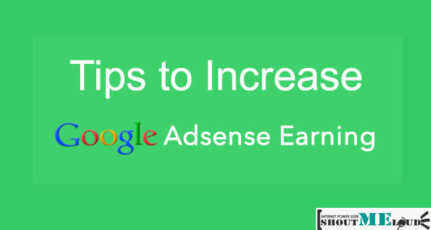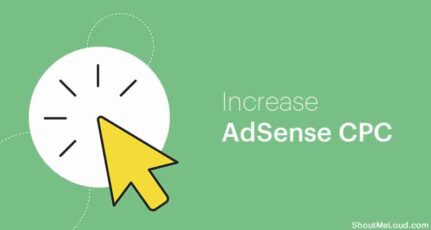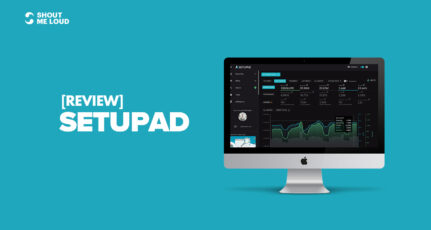
Blogging as a full-time profession has been growing rapidly in India with people from all spheres of life creating their own blogs. A major reason for increasing shift towards professional bloggers is the self-satisfaction associated with doing something of your own and also the monetary income which comes mainly from Google Adsense.
In my earlier guest post for ShoutMeLoud readers, I wrote an article on the overview of income tax on bloggers and freelancers and this article I would mainly be focusing on Income Tax on Adsense Income only. I’m assuming that most bloggers don’t have much knowledge about the manner of computation of Income Tax and I would be explaining everything from the basic and will try to simplify everything as much as possible.
Income Tax on Adsense Income
Firstly, it is important to note that only Income Tax is levied on Adsense Income in India and no other tax like Service Tax, VAT, GST, Excise Duty etc is levied on Adsense Income. Earlier, Service Tax was levied on Adsense Income but now No Service Tax is levied on Adsense Income. Irrespective of how much you earn, Service Tax won’t be levied on Adsense Income in India.
Before explaining the manner of levy of Income Tax on Adsense in India, it is important for a blogger to understand the concept of Financial Year. Income Tax in India is levied on the yearly income earned by a person in a financial year. The Financial year in India starts from 1st April and ends on 31st March. Therefore,
Financial Year 2013-14 would be from 1st April 2013 to 31st March 2014
Financial Year 2014-15 would be from 1st April 2014 to 31st March 2015
The total income earned from Adsense and other sources during a financial year would be added up and tax would be levied as per the Income Tax Slab Rates in force.
The Income Tax Slab Rates are announced by the Finance Minister in the Budget and keep on changing every year. The current income tax slab rates are mentioned in this link: Income Tax Slab Rates for the year 2013-14 and 2014-15.
Once you have computed your total annual income from Adsense and other sources, you can also make use of various income tax calculators which are available both in the web interface and as mobile apps. The most popular web-interface income tax calculator has been prepared by the Income Tax Department itself and can be accessed from this link. The ICICI Bank tax calculator mobile app for Android and iOS is also good in case you prefer to use the calculator as an app on your mobile.
Computation of Total Income from Adsense
To provide services to the advertiser, you would have incurred some expenditure as well like Hosting expense, telephone expense, internet expense etc. Therefore, the amount received from the advertiser is not your income, it is the Revenue. Income is the net amount which you have earned after deducting expenses and depreciation. (The concept of Depreciation has been explained below in this article.)
There is no pre-specified set of expenses which can be claimed. Any expense incurred by you for earning revenue or has the potential of helping you in earning future revenue can be claimed as an expense which will lead to reduction of total income leading to reduction of taxes payable. I’m creating an illustrative list to help bloggers understand the nature of expenses which can be claimed:-
- Hosting Expense
- Domain Renewal Expense
- Telephone Expense
- Internet Expense
- Electricity expense
- Salary Expense
- Website development expense
- Fuel expense
- Meeting Expense
- Content writer expense
This is only an illustrative list and there can be many such expenses which are allowed to be claimed. After computing the total annual revenue, total annual expenses and total annual depreciation, the income would be computed in the following manner:-
| Total Annual Revenue | xxx | |
| (Less) | Total Annual Expenses | (xxx) |
| (Less) | Total Annual Depreciation | xxx |
| (=) | Total Annual Income | xxx |
What is Depreciation?
If for providing your services, you have purchased a laptop worth Rs. 50,000 and installed internet connection on the same @ Rs. 1,000 pm, these are to be subtracted from the total annual revenue. The amount spent monthly on internet connection is an expense of recurring nature and can be shown as an expense as explained above.
However, the amount spent by you on purchasing a laptop is a one-time expense and the expected life of a laptop is usually 2 years. Therefore, the laptop becomes your asset.
Over a period of 2 years, your laptop efficiency will keep on reducing gradually and after 2 years, it will require a change. This gradual effect of reduction in the value of your asset is called depreciation.
As the expected life of your laptop is 2 years, you cannot allocate this cost to only 1 financial year. This will be allocated over 2 years and the formula for the same is as follows:-
| Annual Depreciation = | Total Value of the Asset |
| Total Life of the Asset |
Therefore, the cost of the laptop would be allocated over 2 years i.e. Rs. 50,000/2 = Rs. 25,000. This Rs. 25,000 is the depreciation on laptop every year for 2 years after which you will have to purchase a new laptop.
Depreciation is levied on all assets which have life of more than 1 year. Some examples of assets on which bloggers usually claim depreciation are mobile, laptop, desktop, office furniture, cars etc.
Filing of Income Tax Returns
Once you have computed your total annual income and the tax payable thereon, you would be required to file a statement with the income tax department showing the manner of computation of income and the tax payable thereon. This statement is called the Income Tax Return and is required to be filed every year. All Incomes from Blogging and other online incomes (incl. Adsense, Affiliate, Services etc) are required to be disclosed under the head “Profits or Gains of Business or Profession” and you can submit this information in either ITR 4 or ITR 4S.
The last date for filing the income tax return is 31st July which comes after the end of the financial year. Therefore, for the Financial Year 2013-14, the last date for filing income tax return is 31st July 2014.
However, in case you have a big business and your annual revenue is more than Rs. 1 Crore per year, you would be required to get your income tax audit conducted by a Chartered Accountant and the last date for filing income tax returns, in this case, would be 30th Sept.
Although the returns are required to be filed only once in a year, tax is required to be paid in 3 instalments in the same financial year in which the income has been earned. The payment of tax in instalments in the same financial year in which it is earned is known as Advance Tax.
The procedure for payment of taxes and filing of income tax returns is now fairly convenient as everything can now be done online.
Income Tax is a wide gamut of complications and there may be some intricacies involved in the computation of Income Tax on Adsense. For the purpose of simplicity and a better understanding of the concept of Income Tax, I’ve only given an overview of the computation of Income Tax on Adsense Income.
- Do you need to pay income tax on Adsense Income?
- Yes
- Do you need to pay service tax in income from AdSense?
- AdSense income after 1st October 2014 will fall into service tax category.
If you are not much comfortable with Income Tax, it is always advisable to consult a CA. A CA usually charges Rs. 15,000 to Rs. 30,000 for small business. The rates increase as the scale of business increases. However, before approaching a CA, you should also have some basic knowledge of Income-tax which have been explained above.
Also read:
- Blogging in Indian society and how you can bring change
In case of any queries with respect to levy of Income Tax on Adsense Income and other Advertisement/Affiliate Incomes, please leave your queries them in the comments below and I would be happy to help.





Hi,
I and my friend have a blog. The AdSense revenue comes to my bank account. And we share the profit equally. So as soon as I get the amount from google, I sent the half to my friend’s bank account. In this case, how do we calculate the income tax because our both bank account has money (Mine is the source)
My website’s Adsense earning has exponentially increased since last month (August 2019) which is more than 6 lakhs. We are on track to maintain/increase this earning for future and expecting a total of 50 lakhs for this financial year.
I don’t have any other earning than Adsense, so my questions are –
1.Do i need to register for GST?
2.Do i need to open Current account or should i carry same Saving account i used to get my payment?
Tq so much sir , My previous year annual income from blogging is 3.1 . I am really worrying about how much i have to pay as IT . After reading your article i came to conclusion , now i am going to deduct my expenses from my annual income . Tq so much for the help
Hello,
I need to know I have a income of 100K suppose in a month from my website and have 4 or more members currently work on site. I have to pay them money from my total income. Should I pay tax or any other taxes ? Please help me how to calculate or file tax as per Indian rules.
But I think if our total income from adsense and other sources crosses 20 lakhs per year, then we have to pay GST apart from Income tax. As I read in some blog. Is this correct?
yes, GST should be paid in this case.
GST has to be paid only if you sell any products/services. For your Adsense earnings, you don’t have to pay GST.
Hi, what if one has a youtube channel the name of which is also registered as a sole proprietorship in GST registration certificate and it has a current account which is where the income gets transferred….in this case, will the sole proprietorship entity have to pay any taxes on the income earned from YouTube? Doesn’t YouTube already pay it on behalf of the channel?
The channel owner will have to pay tax in this case. The person who is receiving the income has to pay tax.